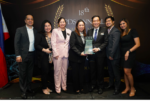Filipinos own an average of 2.3 credit cards as 11.3 million cards were in force as of end 2022, according to the Bangko Sentral ng Pilipinas (BSP).
The Credit Card Association of the Philippines (CCAP) said credit cards can prove highly beneficial for fresh college graduates who are joining the workforce and going through their ‘adulting’ journey.
While local card issuers are prohibited by law to issue a credit card to those who cannot show proof of income from employment or business, fresh college graduates or those ages 18 years old and below can still have access to this financial tool by being a supplementary cardholder.
“Having a supplementary credit card as an initial step can benefit those who are about to enter the formal workforce. “It is important for young people to be equipped with the right tools in managing their adulting life by knowing how credit card can work for their cash flows,” CCAP Executive Director Alex Ilagan said.
A supplementary credit card is an add-on card tied to the existing account (principal or primary cardholder). This allows the supplementary cardholder to enjoy the same credit card benefits as their parents (who, as principal cardholders, would assign a credit limit) while still having full control of how much to spend.
“No one is born with a good credit score so be conscious of your credit behavior,” Ilagan advised young people.
“Track your billing cycles and due dates. Avoid accumulating interest charges and debt to maintain a good credit score. This also helps you track your spending and spot any budget guzzlers you can do without,” Ilagan said.
CCAP conducts credit awareness programs targeted towards the needs of graduating college students.
“Our aim is to educate them as early as possible so they know what credit is and how they can manage their credit cards well when they get theirs. Any organization, not just schools, can reach us for these enlightening seminars,” Ilagan added.
CCAP has been actively conducting credit awareness programs in various colleges and universities since 2017.







